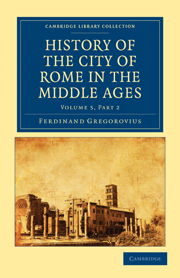CHAPTER VII
Published online by Cambridge University Press: 05 July 2011
Summary
In the thirteenth century knowledge triumphed over barbarism and already assumed an imposing form. Mankind has seldom waged so fierce a struggle to obtain high possessions, seldom accomplished a more serious intellectual work. Italy received a new impulse. Amid the din of arms, and amid political revolutions of almost daily occurrence, priests, philosophers, poets, and artists assembled numerous pupils around them. The achievements of the intellect of the thirteenth century had already taken form in works of lasting value, compiled either during its course or in the beginning of the fourteenth century. The series is marked by the code of Frederick II., by the statutes of the cities, the collections of papal decretals, the works of the great priests, Accursius, Odofredus, and William Durante, the Summa of the schoolman Thomas of Aquinas, the Chronicle of Giovanni Villani, the works of Cimabue and Giotto, finally the immortal poem of Dante, the true monument of the entire spiritual progress of the thirteenth century.
A reflex of the movement also fell on the city of Rome, although the capital of the world, for reasons with which we are acquainted, remained almost entirely unproductive. Of the eighteen popes who had reigned between 1198 and 1303, the greater number were learned men, and no less educated were the cardinals.
- Type
- Chapter
- Information
- History of the City of Rome in the Middle Ages , pp. 608 - 680Publisher: Cambridge University PressPrint publication year: 2010First published in: 1897



